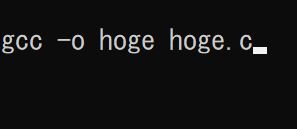gccコンパイラでのコンパイル方法の簡単な覚え書きです。
確認は、WindowsのMinGWをインストールして行っています。
基本的なコンパイル
gcc ソースコード名
使用例
gcc hoge.c
この場合、a.exe(Windowsの場合)という名前の実行ファイルが生成される。
実行ファイル名を指定してコンパイル
gcc -o 実行ファイル名 ソースコード名
使用例
gcc -o hoge hoge.c
この場合、hoge.exeという実行ファイルが生成される。
一応、-oをソースコード名の後にもってきて以下のようにしても同じ。
gcc hoge.c -o hoge
gccのヘルプを表示する
gcc --help
使い方が表示される。
一応、こんな感じ…
Usage: gcc [options] file...
Options:
-pass-exit-codes Exit with highest error code from a phase.
--help Display this information.
--target-help Display target specific command line options.
--help={common|optimizers|params|target|warnings|[^]{joined|separate|undocumented}}[,...].
Display specific types of command line options.
(Use '-v --help' to display command line options of sub-processes).
--version Display compiler version information.
-dumpspecs Display all of the built in spec strings.
-dumpversion Display the version of the compiler.
-dumpmachine Display the compiler's target processor.
-print-search-dirs Display the directories in the compiler's search path.
-print-libgcc-file-name Display the name of the compiler's companion library.
-print-file-name=<lib> Display the full path to library <lib>.
-print-prog-name=<prog> Display the full path to compiler component <prog>.
-print-multiarch Display the target's normalized GNU triplet, used as
a component in the library path.
-print-multi-directory Display the root directory for versions of libgcc.
-print-multi-lib Display the mapping between command line options and
multiple library search directories.
-print-multi-os-directory Display the relative path to OS libraries.
-print-sysroot Display the target libraries directory.
-print-sysroot-headers-suffix Display the sysroot suffix used to find headers.
-Wa,<options> Pass comma-separated <options> on to the assembler.
-Wp,<options> Pass comma-separated <options> on to the preprocessor.
-Wl,<options> Pass comma-separated <options> on to the linker.
-Xassembler <arg> Pass <arg> on to the assembler.
-Xpreprocessor <arg> Pass <arg> on to the preprocessor.
-Xlinker <arg> Pass <arg> on to the linker.
-save-temps Do not delete intermediate files.
-save-temps=<arg> Do not delete intermediate files.
-no-canonical-prefixes Do not canonicalize paths when building relative
prefixes to other gcc components.
-pipe Use pipes rather than intermediate files.
-time Time the execution of each subprocess.
-specs=<file> Override built-in specs with the contents of <file>.
-std=<standard> Assume that the input sources are for <standard>.
--sysroot=<directory> Use <directory> as the root directory for headers
and libraries.
-B <directory> Add <directory> to the compiler's search paths.
-v Display the programs invoked by the compiler.
-### Like -v but options quoted and commands not executed.
-E Preprocess only; do not compile, assemble or link.
-S Compile only; do not assemble or link.
-c Compile and assemble, but do not link.
-o <file> Place the output into <file>.
-pie Create a dynamically linked position independent
executable.
-shared Create a shared library.
-x <language> Specify the language of the following input files.
Permissible languages include: c c++ assembler none
'none' means revert to the default behavior of
guessing the language based on the file's extension.
Options starting with -g, -f, -m, -O, -W, or --param are automatically
passed on to the various sub-processes invoked by gcc. In order to pass
other options on to these processes the -W<letter> options must be used.
For bug reporting instructions, please see:
<https://gcc.gnu.org/bugs/>.



コメント